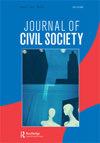Social Participation in Context. Participatory Culture in Spain and Germany
IF 0.9
Q3 POLITICAL SCIENCE
引用次数: 0
Abstract
ABSTRACT This article aims to examine and describe the ways in which elderly people participate in post-industrial societies. The literature points out the benefits of social participation. However, the influence of context in features of civil society has remained relatively understudied. This article analyses the influence of context on the conceptualization of the phenomenon of social participation and civic engagement. In addition, the findings are linked to the broader academic debate on civil society. This empirical study consists of results from semi-structured interviews and focus groups conducted with experts on social participation and elderly members of different associations. The German and Spanish case studies confirm that socio-demographic variables, cultural frames, political structures and social structure shape the culture of participation. The article argues that each context creates its own participatory culture through the incorporation of four different conceptualisations of participation: (1) participation as a right; (2) participation as an attitude; (3) participation as civic engagement; (4) participation as a slogan. The Spanish discourse tends mostly to conceptualize participation as a right and/or a slogan. The German discourse conceptualizes participation mainly as civic engagement. These conceptual differences give rise to two different participatory culture models.情境中的社会参与。西班牙和德国的参与式文化
摘要本文旨在考察和描述老年人参与后工业社会的方式。文献指出了社会参与的好处。然而,语境对公民社会特征的影响仍然相对不足。本文分析了语境对社会参与和公民参与现象概念化的影响。此外,这些发现与更广泛的民间社会学术辩论有关。这项实证研究由半结构化访谈和焦点小组的结果组成,这些访谈和小组由社会参与专家和不同协会的老年成员进行。德国和西班牙的案例研究证实,社会人口变量、文化框架、政治结构和社会结构塑造了参与文化。文章认为,每一种背景都通过纳入四种不同的参与概念来创造自己的参与文化:(1)作为一种权利的参与;(2) 参与是一种态度;(3) 作为公民参与的参与;(4) 参与作为一个口号。西班牙的话语大多倾向于将参与概念化为一种权利和/或口号。德国话语主要将参与概念化为公民参与。这些概念上的差异产生了两种不同的参与式文化模式。
本文章由计算机程序翻译,如有差异,请以英文原文为准。
求助全文
约1分钟内获得全文
求助全文

 求助内容:
求助内容: 应助结果提醒方式:
应助结果提醒方式:


